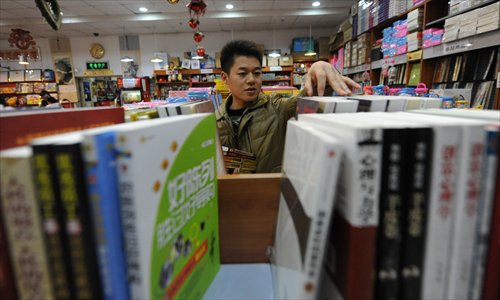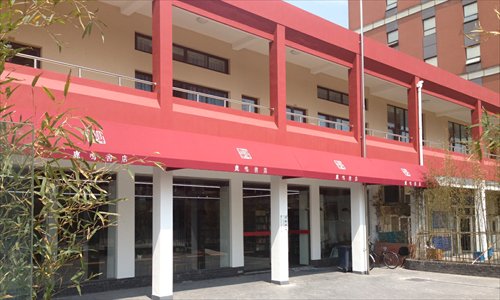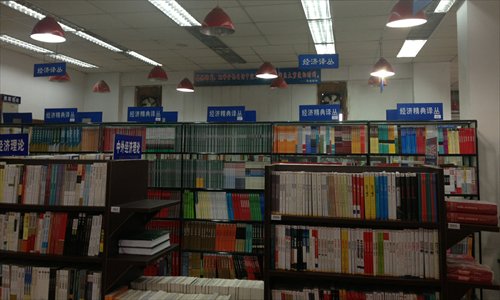A brand-new chapter

Independent bookstores used to dot Shanghai's university areas but over the last decade they have been disappearing from the city. Photo: CFP
On March 16, the Luming bookstore officially moved to its new home in Fudan University's southern campus. Located close to the entrance on Zhentong Road and with a minimalistic exterior with brick-red canopies and white logo, Luming is the one and only surviving independent bookstore around Fudan.
Independent bookstores used to dot Shanghai's university areas but over the last decade they have been disappearing from the city. At Fudan, for example, a number of independent bookstores - Luosu, Kaiming, Qi'e, Taoba, Sanwei, and Shengle - closed down in 2007 alone. In 2008, Fudan students and graduates lamented the closing of the popular Zuoan ("Left Bank") store on Guonian Road. In 2011, Qingyun, then the last bookstore in the southern campus, said farewell after eight years.
The closures were a result of rising rents and declining sales, a by-product of the growing popularity of online book shopping and digital reading - Qingyun, for example, suffered a 20-30 percent annual drop in sales from 2004.
Luming, the last surviving bookstore, has also suffered. When Luming opened business in 1997 the 20-or-so-square-meter shop was making nearly 2,000 yuan ($323) daily, and in 2000 it relocated to 334 Guoquan Road, a few hundred meters from the entrance to Fudan University's southern campus. Since 2004, however, sales have been dropping constantly and since 2011 business has not been profitable.
Gu Zhentao, a soft-spoken postgraduate of Fudan University's Department of Chinese, is one of the two founders of Luming. He told the Global Times that the agreement to lease the old premises expired last year. It had taken him two months to find a new place, but the alternatives he had viewed were either inappropriate or too pricey.

The new Luming bookstore Photo: Liao Fangzhou/GT
Spreading ideas
At the same time Gu was trying to find a new place, Fudan University's logistics team saw that these premises were empty and were considering using them for a bookstore. "We know it is a very difficult time for bookstores because of the increasing slice of the market going to online bookstores but we think it is important that there is a bookstore within this university to help spread academic ideas and thoughts," said Zhang Xun, the general manager of Fudan University's logistics division.
Both sides had a need and so agreement was soon reached. The university does not charge Luming any rent. Zhang said the university provided the venue for free and collected a proportion of the bookstore's income.
Gu sees this as a win-win situation. It eases the financial burden on the shop and for the university the bookstore helps add to the academic environment. Profits from the books will also help - they could be worth more than the premises would collect in rent.
In the shop itself the latest publications are displayed on a table in the middle of the store. "A majority of our books are about ancient Chinese, literature, history, philosophy, archeology, and linguistics. We see Luming as an academic, research-oriented, and upmarket bookstore," Gu said.
It seems to have been a good notion - many of the city's leading academics have become regulars at the shop.
Intellectual exchanges
Gu said Luming would become a venue for intellectual and cultural exchanges. "We held our first book event with East China Normal University's Chinese professor Chen Zishan and Zhonghua Book Company's general manager Xu Jun as the speakers, and at the end of March Fudan University's history professor and former library director Ge Jianxiong will lecture here. There will be regular events like this twice a week." Information about the shop, its events and the new publications are available on Luming's official microblog.
Beside the shop's elegant French windows are two rows of small tables and chairs which local newspapers, like the Jiefang Daily, have noted as a perfect place for coffee while flicking through newspapers, or magazines and chatting. Some have compared the shop to the popular Eslite chain of bookstore cafés in Taiwan but Gu said Luming was definitely not following the Eslite style. "Eslite targets general consumers and attracts them for drinks and recreation with books. Luming, in contrast, aims to provide a serious and inspiring reading experience that is not necessarily relaxing and might even be exciting or overwhelming at times."
Professor Chen Zishan, one of the speakers at Luming's first event, told Beijing Business Today that the partnership of Luming and Fudan University set a good example for universities over the country to support and preserve bookstores.
But Luming is not the first independent bookstore that a city university has supported by not charging rent.
This was how East China Normal University encouraged a Jifeng branch in 2011 and it became the only independent store for its Minhang campus - this was the only independent store near the university after poor returns had seen stores close at its Putuo campus. Like Luming, it did not just sell books, but presented literary salons and events.
But even without rent to pay, this bookstore ran into financial problems and closed in February. Yu Miao, the CEO of Jifeng, told the Youth Daily that the bookstore was not popular with students partly because the bookstore was some distance from their dormitories and was on a road where there was constant disruptive construction. He said he had closed the shop not just because it was losing money but because it was not attracting customers.
Luming might be luckier. "Since it reopened there have certainly been more customers. The good location has attracted people and the spacious and comfortable design helps," Gu told the Global Times.
Discouraging
Meanwhile other independent bookstores are still struggling on their own.
At Saier, a small independent bookstore on Zhanghua Road just opposite the main entrance to Tongji University, the staff (who wished to remain anonymous) said that business had been discouraging for nearly 10 years and the shop "barely survives."
Tongji University is noted for architecture and German and the Saier bookstore has plenty of books on these two subjects. A lot of foreign students also use the bookstore but mainly for its Chinese language books.
"Given their smaller overall numbers, the proportion of foreign students buying from here is far bigger than Chinese. This might be because it's not easy for them to purchase books online because of language problems and the payment process," a staff member said.
Internet book shopping was regarded as the biggest challenge by the staff. "We've been thinking about how to cope with it over the years, but honestly there is no answer."
Beitu, which is on the second floor of the same mall where Saier is found, is a specialized architectural bookstore offering scores of richly illustrated coffee-table books.
On a Monday afternoon several people were seen in the shop but few seemed to be buying. Yao Man is a sophomore from Tongji University and she said she was here to check out a particular book on the history of Chinese architecture, "I visit the bookstore to get an idea of the actual book to make sure it is worth it and then buy it online, which saves me about 10 yuan. This is what a lot of my friends are doing. In the long term the savings can be quite substantial."
Also struggling is Xueren, an independent bookstore chain that targeted universities. There were several Xueren outlets across Shanghai but the number dropped to three by 2013. In January, one of the remaining outlets in Shanghai Jiao Tong University closed - according to former manager Wang Wusen, it was only seeing about 20 customers daily.
But Zhou Huan, a master student of Shanghai Normal University, said she still goes to the Xueren branch at her campus. "This is where I can get the recommendations from my booklists right after lectures, and I think it's really convenient. If I can't find a book here or online I can order it here. This takes a little time but I'm happy with the service."
Luming's Gu still has faith in the sustainability of independent bookstores. "The functions and values of real bookstores and online bookstores are different. Online you search and buy a book when you know exactly what you are looking for. But many Luming customers don't have anything particular in mind - they just want to spend time in a shop catering to their tastes and interests, and enjoy the pleasure of discovering, perhaps accidentally, some treasures."

Jingshi is the place where you can find publications from Fudan University's publishing house. Photo: Liao Fangzhou/GT
Publisher links
Almost all universities now have bookstores attached to their own publishing houses. Unlike many independent bookstores, these are surviving but there are also problems.
Ms Wu manages a bookstore within a short stroll of the Shanghai International Studies University. Her shop is attached to the Shanghai Foreign Language Education Press, but she told the Global Times that business was getting "worse and worse."
She said to cope with the situation the bookstore had increased the variety of books, but most of these were reference books for language learning. "They target students - not just university students from Shanghai International Studies University, but nearby middle school students as well as those taking classes in foreign language institutions."
The Jingshi bookstore is part of Fudan University's publishing house. When the Global Times visited on a Monday morning, businessman Tao Hongwei from Shandong Province was one of the 10 or so customers looking over the books in the "Economics and Management" section. "Every time I visit a city I go to its leading universities and shop in their publishing house bookstores. Universities without bookstores would be unimaginable."